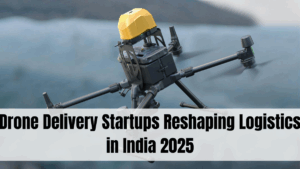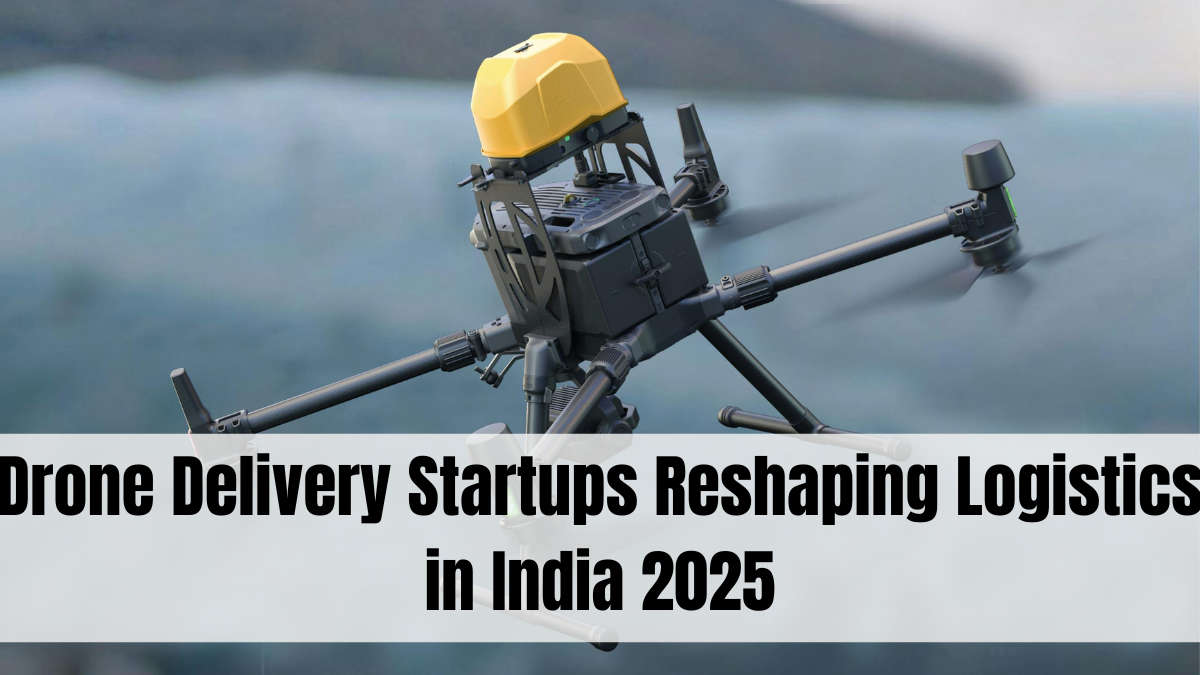In 2025, India’s logistics landscape is undergoing a transformative shift driven by innovative drone delivery startups India 2025. Leveraging advancements in unmanned aerial vehicles (UAVs), these startups are pioneering faster, cost-effective, and eco-friendly delivery solutions that are reshaping supply chains across urban and rural areas.
This article explores the rise of drone delivery startups in India, key innovations, regulatory environment, challenges, and future growth prospects.

Why Drone Delivery Matters for India’s Logistics Sector
India faces unique logistical challenges, including traffic congestion in metros, difficult terrain in rural regions, and rising last-mile delivery costs. Drones offer promising solutions by:
-
Bypassing ground traffic to reduce delivery time dramatically.
-
Accessing remote or difficult-to-reach areas efficiently.
-
Lowering carbon footprint compared to traditional vehicle fleets.
-
Providing scalable options for e-commerce, healthcare, agriculture, and disaster relief.
-
Enabling contactless delivery, increasingly important post-pandemic.
These benefits make drones a game-changer for India’s growing delivery demands.
Leading Drone Delivery Startups in India 2025
1. Garuda Aerospace
One of India’s pioneering drone companies, Garuda Aerospace offers drone delivery services for medical supplies, e-commerce, and agriculture. They focus on integrating AI for route optimization and real-time tracking.
2. Skylark Drones
Specializes in drone-based logistics and mapping solutions with a strong focus on data analytics and customized delivery solutions for industries.
3. Aarav Unmanned Systems
Known for developing advanced UAVs capable of long-range deliveries and payload versatility, contributing to sectors like pharmaceuticals and retail.
4. ideaForge
A defense and commercial drone manufacturer, expanding into delivery drones with rugged models suited for India’s diverse geography.
5. Dronamics India
Operating in the cargo drone segment, this startup focuses on medium-distance freight delivery to improve regional connectivity.
Innovations Driving the Drone Delivery Ecosystem
-
AI-Powered Flight Paths: Dynamic route planning avoids obstacles and adapts to weather conditions.
-
Automated Loading and Unloading: Reduces human intervention and speeds up operations.
-
Battery Technology Advances: Extended flight times and quick recharge improve efficiency.
-
Regulatory Tech Compliance: Blockchain and secure communication protocols ensure compliance and safety.
-
Integration with Existing Logistics Networks: Seamless handoff between drones and ground transport optimizes supply chains.
These technologies position startups for scalable and reliable operations.
Regulatory Landscape for Drone Deliveries in India 2025
The Directorate General of Civil Aviation (DGCA) has progressively relaxed drone usage norms while implementing safety guidelines including:
-
Mandatory registration and licensing for drones above specified weight.
-
No-fly zones around sensitive areas strictly enforced.
-
Requirement for real-time tracking and geo-fencing technology.
-
Pilot certification and operator training standards.
Ongoing government initiatives promote drone innovation while ensuring airspace security.
Challenges Faced by Drone Delivery Startups
-
Infrastructure Gaps: Limited drone ports and charging stations hinder large-scale deployment.
-
Air Traffic Management: Coordinating drones alongside manned aircraft poses technical challenges.
-
Weather Dependency: Monsoon and high winds affect operational reliability.
-
Payload Limitations: Most drones handle small parcels; heavy cargo delivery remains nascent.
-
Public Acceptance: Building trust around safety and privacy remains critical.
Addressing these will be key to mainstream adoption.
Future Outlook: Drone Delivery in India
-
Expansion into healthcare delivery, especially in remote regions, improving emergency response.
-
Collaboration with e-commerce giants to reduce delivery times and costs.
-
Use in agriculture for supply of seeds, fertilizers, and real-time crop monitoring.
-
Development of drone highways and dedicated corridors for commercial UAVs.
-
Enhanced AI and automation leading to fully autonomous drone fleets.
As technology matures, drone delivery startups are poised to revolutionize India’s logistics sector.
FAQs
What kind of products can drone delivery startups handle?
Primarily small parcels like medicines, electronics, documents, and food items.
Are drone deliveries legal across all Indian states?
Yes, under DGCA regulations, with adherence to licensing, no-fly zones, and safety norms.
How far can delivery drones typically fly?
Ranges vary, commonly between 10 to 50 kilometers depending on the drone model.
What are the main advantages of drone delivery over traditional methods?
Speed, cost-efficiency, accessibility to remote areas, and reduced carbon footprint.
Are there any environmental concerns with drone delivery?
Drones are generally eco-friendly, but battery disposal and noise pollution require regulation.
Click here to know more.
